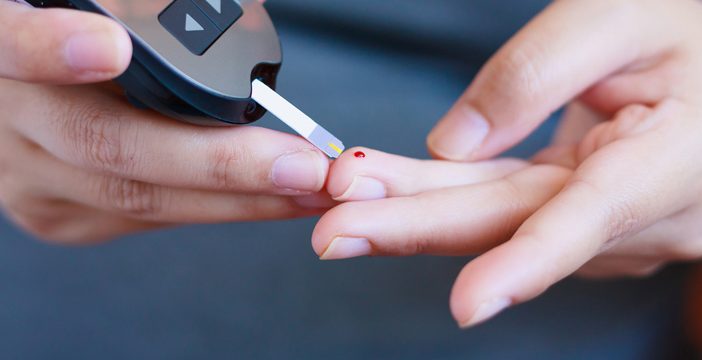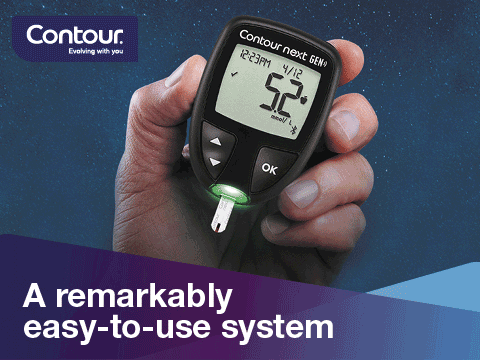
Why monitor your blood sugar levels?
Whether you have type 1 or type 2 diabetes, monitoring blood sugar is an important part of your management regimen. Blood sugar monitoring provides a lot of useful information, as it can help you:
- Judge how well you’re reaching your blood sugar targets
- Know how diet and exercise affect your blood sugar levels
- Understand how other factors (for example, illness or stress) affect your blood sugar
- Monitor the effect of your diabetes medications on your blood sugar levels
- Identify “highs” (hyperglycemia) and “lows” (hypoglycemia)
How to check blood sugar levels?
Blood sugar levels are checked by using a blood glucose meter, which is available from any pharmacy. The meter uses a strip, which is inserted into the meter once you’ve placed a drop of blood on it; the blood should be taken from your finger using a lancet
How often should you check?
Your healthcare team can help you figure out how often you need to check your blood sugar levels. The frequency of testing depends on a number of factors, including:
- Whether your A1C and blood glucose levels are at target
- If you take medications or insulin to manage your diabetes
- How long you’ve had diabetes
- Whether you have any complications, or are at risk for complications
- Your overall general health, and whether you have other medical conditions (for example, high blood pressure or high cholesterol)

What are target blood sugar levels?
Keeping your blood sugar levels in their target range is important to help you live a healthy life and prevent or delay diabetes complications.
The target blood sugar range for most people with diabetes is:
- 4.0 to 7.0 mmol/L before eating a meal, and
- 5.0 to 10 mmol/L two hours after the start of a meal
Your “glycated hemoglobin” level (expressed as A1C) is also an important measure of your blood sugar levels. A1C is a blood test that is done in a laboratory with a sample of your blood. It is a measure of the level of glucose in the blood for the past 3 months.
The target A1C for most people with diabetes is 7.0% or lower.
Interpreting your blood sugar results
Once you have recorded the results of your blood sugar monitoring over a period of weeks or months, you and your healthcare team can review them to see if there are any consistent patterns of highs or lows. Some things that can affect your blood sugar levels include:
- The type and amount of food eaten. It is particularly important to take note of foods and drinks that contain carbohydrates.
- The speed with which the body digests food and creates blood glucose.
- The effect of physical activity on the body.
- The effect of stress on the body
- Medications – especially insulin and some oral medications
- Illness

Once you have identified any patterns of high or low blood sugar levels, you and your healthcare team can make any lifestyle or medication changes needed in order to keep your blood sugar levels within target.
Overcoming barriers to blood sugar monitoring
Some people find it difficult to incorporate blood sugar monitoring into their daily or weekly routines. There are lots of reasons for this:
- If blood sugar readings are consistently high, it can be upsetting
- Monitoring seems pointless
- Finger pricks to get a drop of blood are uncomfortable
- Monitoring is inconvenient
Blood sugar monitoring is an important tool that can help you manage your diabetes effectively and prevent or delay complications.
Blood Glucose Monitoring Articles
 Blood glucose monitoring: to check and when to check? That is the question!Self-monitoring of blood glucose (SMBG) has been around for over 50 years. In fact, I think sometimes it may be taken for granted.
Blood glucose monitoring: to check and when to check? That is the question!Self-monitoring of blood glucose (SMBG) has been around for over 50 years. In fact, I think sometimes it may be taken for granted. Overcoming barriers to blood glucose monitoringAs someone living closely with diabetes, you have heard the diabetes healthcare team talk about the importance of blood glucose monitoring.
Overcoming barriers to blood glucose monitoringAs someone living closely with diabetes, you have heard the diabetes healthcare team talk about the importance of blood glucose monitoring. How to check blood glucose levelsIf you have diabetes, check blood glucose at regular intervals. It is one of the best things you can do to manage your diabetes
How to check blood glucose levelsIf you have diabetes, check blood glucose at regular intervals. It is one of the best things you can do to manage your diabetes Blood glucose level fluctuations: not all blood glucose levels need to be perfectDespite all the advances in recent years, the fact remains that diabetes management is not a perfect science. Your may follow the diabetes healthcare recommendations to the letter and then suddenly,out of the blue, large blood glucose level fluctuations occur.
Blood glucose level fluctuations: not all blood glucose levels need to be perfectDespite all the advances in recent years, the fact remains that diabetes management is not a perfect science. Your may follow the diabetes healthcare recommendations to the letter and then suddenly,out of the blue, large blood glucose level fluctuations occur. What are the 5 main factors that affect blood glucose levels?For people living with type 1 or type 2 diabetes, one of the major goals is targeting near-normal blood glucose levels over the long-term. Studies have shown that prolonged elevated blood sugar is the major risk factor for developing complications of diabetes
What are the 5 main factors that affect blood glucose levels?For people living with type 1 or type 2 diabetes, one of the major goals is targeting near-normal blood glucose levels over the long-term. Studies have shown that prolonged elevated blood sugar is the major risk factor for developing complications of diabetes Target blood glucose levelsBlood glucose levels change across the course of a day, and can vary depending on the foods you eat and physical activity levels.
Target blood glucose levelsBlood glucose levels change across the course of a day, and can vary depending on the foods you eat and physical activity levels. A1C...what it should mean to me!If you have diabetes, it is important to know what the A1C (sometimes called hemoglobin A1C) test is, and how the diabetes team uses the A1C.
A1C...what it should mean to me!If you have diabetes, it is important to know what the A1C (sometimes called hemoglobin A1C) test is, and how the diabetes team uses the A1C. Tips for reducing pain with blood glucose monitoringPricking your finger every single day - and often more than once a day - is an important part of your diabetes management.
Tips for reducing pain with blood glucose monitoringPricking your finger every single day - and often more than once a day - is an important part of your diabetes management. What’s the difference between A1C and blood sugar?The terms A1C and blood sugar are frequently used when talking about diabetes. But what is the difference between A1C and blood sugar, and how do they relate?
What’s the difference between A1C and blood sugar?The terms A1C and blood sugar are frequently used when talking about diabetes. But what is the difference between A1C and blood sugar, and how do they relate? Measuring blood sugar levels throughout the dayShould you be measuring blood sugar levels throughout the day? While it’s true that people with diabetes should measure their blood sugar at regular intervals, there are some distinctions regarding how often to test.
Measuring blood sugar levels throughout the dayShould you be measuring blood sugar levels throughout the day? While it’s true that people with diabetes should measure their blood sugar at regular intervals, there are some distinctions regarding how often to test.

